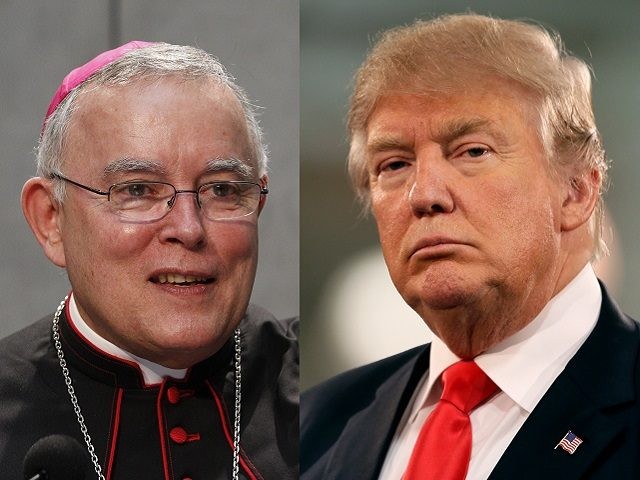Philadelphia Archbishop Charles J. Chaput said he is astonished by the mainstream media’s ongoing war against Donald Trump, while urging patriotic citizens to get behind the president.
“It’s just amazing to me how hostile the press is to everything the president does,” Chaput told a radio talk show host Monday.
“I don’t want to be partisan in my comments here, but it seems to me if we are really serious about our common responsibilities, we support the president,” Chaput said, adding that good citizens should “wish him success rather than trying to undermine him.”
The Archbishop holds solid credentials for making his case, since he was sharply critical of Donald Trump during the election cycle. In an article last October, Chaput characterized Trump as a “a vulgar, boorish lout and disrespecter of women, with a serious impulse control problem.” (Granted, he reserved even choicer epithets for Hillary Clinton, calling her “a scheming, robotic liar with a lifelong appetite for power and an entourage riddled with anti-Catholic bigots”).
Chaput said that there is an important place for responsible criticism of a sitting president, which is different from a persistently adversarial relationship. It is “important for us to at least hope for success so that our country can come to a better place,” he said.
For the redoubtable Archbishop, who clearly was no fan of Trump’s, urging the nation to unite under its democratically elected leader represents a rare voice of calm rationality amidst a frenzied cacophony of protests.
Chaput’s chastisement of the mainstream media regarding their treatment of the U.S. President fits into a larger critical narrative proposed by the Archbishop, who views the media as a largely negative influence on American culture.
In a new book, Strangers in a Strange Land, due for release next Tuesday, Chaput lays out a road map for living the Christian faith in a post-Christian world, which includes dealing with media that seek to undermine values that Christians hold dear.
Pulling no punches, Chaput writes that “our mass-media culture works to make people shallow, gullible, angry, and dumb much of the time,” while offering “a steady diet of congenial, practical atheism, highlighting religious hypocrisy and cultivating consumer appetite.”
The mass media, he writes, tend to have “a corrosive effect on traditional certainties and patterns of life.”
While never advocating a siege mentality or withdrawal from the battle for America’s soul, the Archbishop does urge media users to be savvy, weighing the information and perspectives offered with a critical eye.
The constant flow of information provided by today’s mass media affects the way things are perceived, Chaput argues. “What people come to know is not reality as such, but what they are shown.”
On the downside, “constant repetition of selected items of information involves a decline in critical awareness, and this is a crucial factor in forming what is considered public opinion,” he writes, drawing on a text from the Pontifical Council for Culture.
The archbishop does not leave his critique in the abstract, but lays out specific areas where he sees “the increasingly explicit editorial bias in the nation’s flagship news organizations” to be especially corrosive.
On the topic of abortion, for instance, Chaput blasts “a chronic newsroom prejudice” whereby “Planned Parenthood is assumed good,” while its critics are assumed bad. Moreover, “the language of ‘abortion rights,’ common in most newsrooms, has the familiar Orwellian ring of avoiding an unpleasant reality (killing a child in utero) by calling it something else,” he writes.
Likewise, when dealing with the contentious issue of transgenderism, Chaput sees a similar media prejudice.
“Media coverage of transgender issues has been lavish and lopsidedly positive,” he writes. “It has also been based on science that is at best inadequate and at worst gravely flawed.”
While mainstream media bias often manifests itself by politically correct language and positions, Chaput contends, at other times it does so through its silence around newsworthy topics.
“We live at a time when Muslim extremists destroy Christian churches and holy sites, kidnap and enslave Christian women, and publicly slaughter Christian men in many parts of Africa and the Middle East,” he writes, and yet these stories receive “only modest attention from American and European news media.”
Media scandals, like other scandals, follow a discernible pattern, the Archbishop believes.
“In nearly every case the pattern is similar: Truth is adjusted or ‘interpreted,’ ignored or justified away, to get seemingly urgent results. And deceit then spreads and takes root like a weed,” he writes.
In a world where news stories are spun out of conjecture, then repeated until believed as true, the Archbishop’s sensible warnings could not be more opportune.
Follow Thomas D. Williams on Twitter Follow @tdwilliamsrome

COMMENTS
Please let us know if you're having issues with commenting.